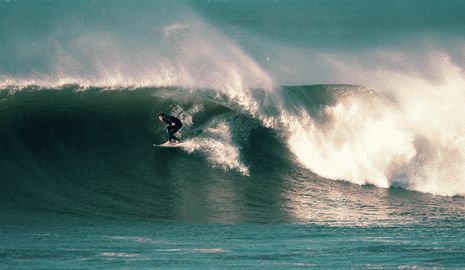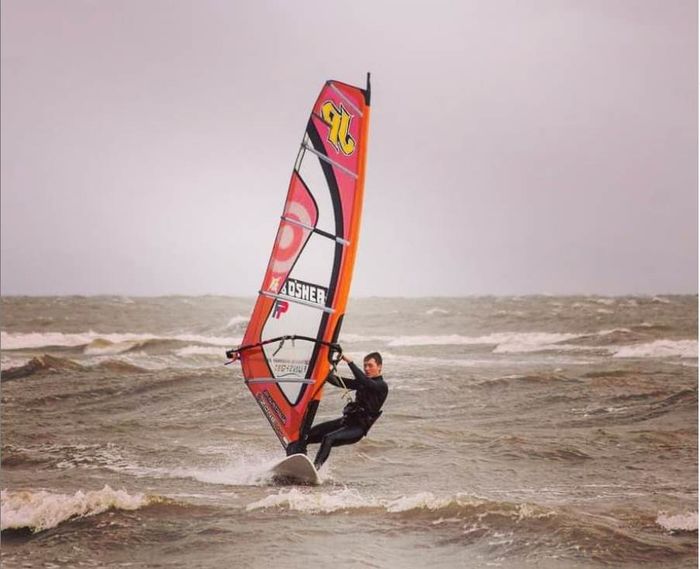Waves and worries: Surfing and mental health
Drawing on his childhood experience of Cornwall, Linus Uhlig analyses the long-term dangers of pursuing a career in surfing.

Picture this: you’re 13 years old, sitting astride your surfboard outback as the sun plunges into the sea on the horizon. Beside you are many of your close friends. You exchange jokes and comments between waves. Then a set appears in the distance, everyone paddling frantically to catch a wave. You watch your friend take off, their head dipping in and out of view as they pump, turn and cutback before trying a more audacious air. Adrenaline is running high, young minds filled with ecstasy and euphoria.
These are how many summers are spent for kids growing up in Cornwall and it was my experience until I became a more sporadic fair-weather surfer during my teenage years. Yet it was not until I left my hometown that I have come to realise the unintended and unfortunate impact of the sport on young people.
“The prospect of making a living from traveling and doing the sport you love is something many youngsters go to bed dreaming about.”
Despite the fact that Britain is an island, the number of people who grow up on a coastline with consistently good surf is small, so Cornwall has always been a hotbed for producing British surfers. Friends and peers of mine have made the national team throughout the years, after being spotted at a young age and sponsored by well-known brands such as RipCurl, RVCA, Billabong, and Monster Energy. For many kids in Cornwall, being scouted and invited to train with the British team is as exciting as receiving an offer to trial at Manchester United. The prospect of making a living from traveling and doing the sport you love is something many youngsters go to bed dreaming about.
Some children and teenagers are forced to pick between their education and their sporting passion, with many often opting to miss school to compete in competitions around the world, or leave education altogether at 16 in order to pursue a surfing career. These groms (a colloquial name for a young surfer) stay in picturesque locations, spend all day in the sun and the sea, and their sponsors tend to cover some or all of the costs, meaning they become accustomed to a rather opulent lifestyle at a young age.
“I travelled more than most people ever will in their life.”
Unfortunately, very few young British surfers in the UK make enough to sustain themselves financially. Lots are dropped by their sponsors once they get to 18-20 and do not reach the same heights as their French, Aussie, and Indonesian counterparts who grow up surfing consistently better waves than the Brits. This leaves young adults underqualified and unequipped for their formative years with no obvious way out of their hometown. Some manage to go into modelling or coaching, but many are not so fortunate. More often than not, this impacts mental health in a deeply negative way.
Cornwall, tragically, has one of the highest suicide rates in the country at 14.5 per 100,000 population, 50% higher than the national average of 9.6 per 100,000, and problems associated with mental health are unfortunately not uncommon. The fault of this of course does not necessarily lie at the feet of the sponsors; some young Cornish surfers have gone on to achieve great success, winning British and European Championships, and the sport of surfing itself is, like many forms of exercise, beneficial for both mental and physical wellbeing.
The problem that Cornwall faces is that, when mental health and suicide support is needed, it is not available. Whilst the county has an abundance of ice-cream kiosks and pasty shops, it is not so well served in terms of healthcare, with only one major hospital and many residents forced to travel miles from remote locations to attend a GP practice or receive support. Community-orientated projects, such as The Pearl Exchange in North Cornwall, consequently have needed to pick up the slack caused by a lack of funding and resources and support youngsters.
“...the mental health issue comes into play when you don’t have qualifications and all your mates have left home.”
Kit Innes, a 20-year old surfer from Bude, Cornwall, told Varsity that he has no regrets about leaving school at 16 to surf for his country and pursue his passion. Reflecting on the last few years of his life, Innes looked backed fondly, saying: “in the space of three years, I travelled more than most people ever will in their life.” However, when becoming a professional athlete did not materialise and Innes returned to his hometown he admitted that it was “difficult” because of “the lack of opportunities.” “Although I am quite driven and can always find opportunities,” Innes said, “I still do have moments when I feel alone and that I’ve missed out on experiences with my mates, so it can be hard to find a sense of direction.” As someone who left education at 16, Innes confessed that he was lucky to have such a supportive network behind him that gave him drive and determination, but also that “the mental health issue comes into play when you don’t have qualifications and all your mates have left home.”
In a county with some of the most deprived areas in the UK and child poverty rates of almost 45% in some towns (well above the national average of 30%), the aid is tragically not there for everyone. So whilst surfing is a thrilling sport and the prospect of doing it for a living is too enticing for many young groms to resist, the support and opportunities in remote regions of the UK require vast improvement to pick young athletes up if they fall. In a time when isolation is such a regular buzzword, let’s ensure young people’s solitude is not needlessly exacerbated.
 Features / Should I stay or should I go? Cambridge students and alumni reflect on how their memories stay with them15 December 2025
Features / Should I stay or should I go? Cambridge students and alumni reflect on how their memories stay with them15 December 2025 News / Cambridge study finds students learn better with notes than AI13 December 2025
News / Cambridge study finds students learn better with notes than AI13 December 2025 Comment / The magic of an eight-week term15 December 2025
Comment / The magic of an eight-week term15 December 2025 News / News In Brief: Michaelmas marriages, monogamous mammals, and messaging manipulation15 December 2025
News / News In Brief: Michaelmas marriages, monogamous mammals, and messaging manipulation15 December 2025 News / Uni Scout and Guide Club affirms trans inclusion 12 December 2025
News / Uni Scout and Guide Club affirms trans inclusion 12 December 2025










